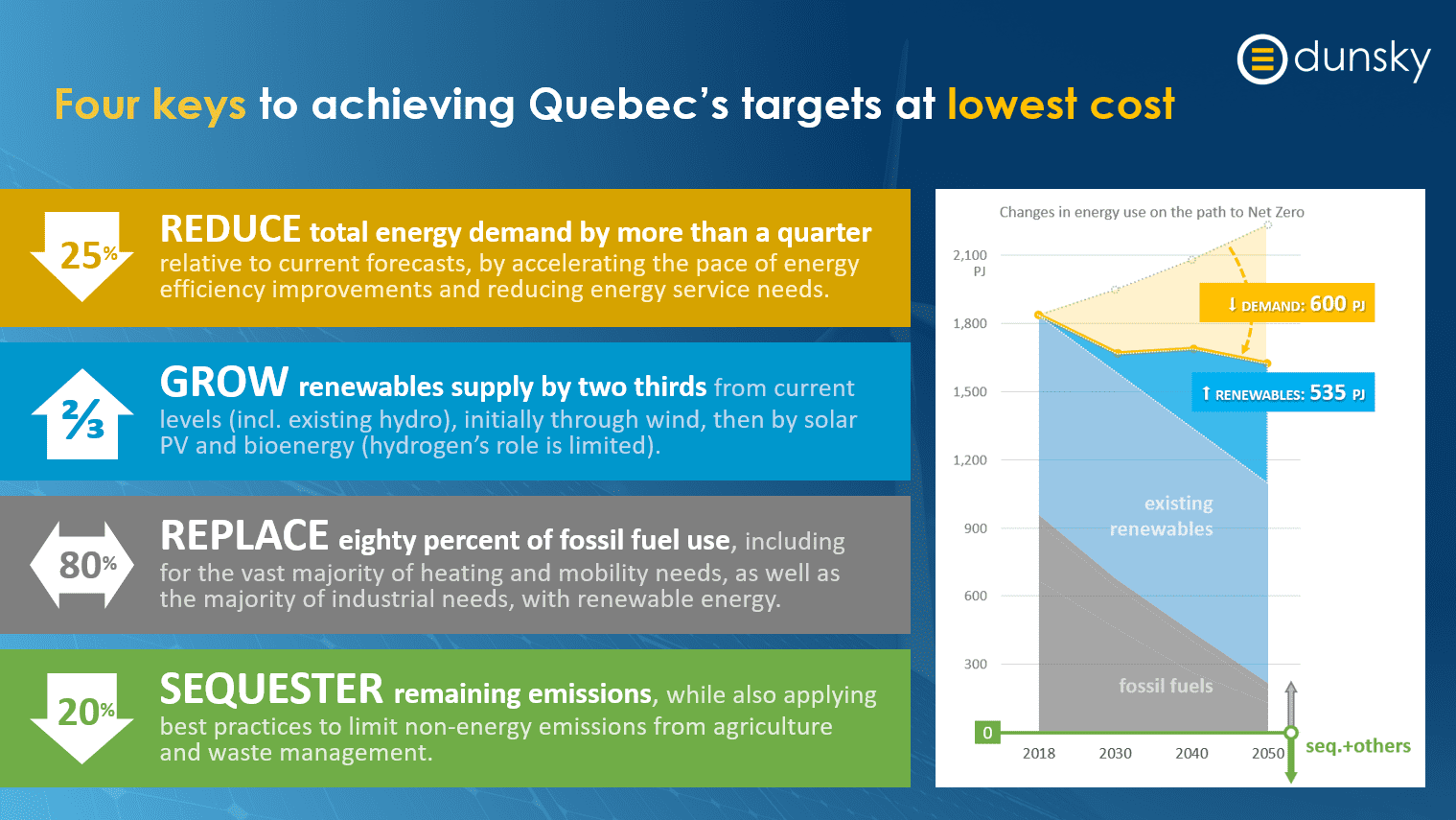Dunsky Advises Government of Quebec on Pathways to Achieve Climate Targets

Can an entire economy actually achieve net-zero emissions? Dunsky recently completed a comprehensive update to its landmark “Pathways” study for the Quebec Government, which quantifies the least-cost pathways to decarbonize the province’s economy (achieve deep emissions reductions by 2030, followed by net-zero emissions by 2050).
Economy-wide in its scope, the original 2019 study served as the launchpad for the development of the Government’s 2030 Plan for a Green Economy, and this update will ensure that it continues to serve as a practical roadmap for the province to meet its ambitious climate targets.
“The report puts forward promising and cost-effective measures and technologies for decarbonizing Quebec’s economy, providing clarity and value to the government as it decides which actions to prioritize in the coming years,” said Benoit Charette, Quebec Minister of the Environment and the Fight Against Climate Change.
“Slashing emissions is both a necessity and one of the biggest economic challenges of the past century,” said Philippe Dunsky, President of Dunsky Energy + Climate Advisors. “The approach used in this study offers a detailed, real-world roadmap that governments can leverage to not only inform comprehensive GHG reduction plans, but to achieve the best possible economic outcomes in the process.”
Rather than looking at things in silos, the study takes an integrated approach to understand how thousands of discrete technologies and practices would interact and impact each other, providing a far more reliable and actionable plan for our clients. Using the NATEM optimization model, Dunsky and its partner ESMIA developed a sophisticated, granular view of how Quebec’s energy economy will need to be reshaped to achieve targets at lowest cost. In painting a clear picture – for each sector, energy source, natural resource and technology – the study enables a reliable, fact-based conversation about the province’s policy options.
The study finds that in order to achieve its net-zero targets at the lowest cost, Quebec must focus its actions across four areas:
- Slash total energy use by over 25% compared to current projections, primarily by accelerating the rate of improvements in energy efficiency across all sectors;
- Steadily replace the lion’s share of fossil fuels (>80%) with clean electricity and, to a lesser extent, bioenergy sources, across most end-uses (nearly all of heating and transportation needs, and a majority of industrial demands);
- Grow domestic production of renewable energy by 2/3, primarily through additional wind power, followed by solar PV and various forms of bioenergy (hydrogen plays a targeted – albeit much smaller – role).
- Slash non-energy emissions – primarily agricultural (e.g. feedstocks, other practices) and waste – and eliminate the remaining <10% of emissions through carbon capture and sequestration techniques (in addition to the protection of natural carbon sinks) over time.

This study follows an earlier one conducted for Quebec, when its GHG targets included reducing emissions by 37.5% by 2030 compared to 1990 levels and 80-95% by 2050. Since then, the province has adopted a new target of being 100% carbon-neutral by 2050. The update reflects this new target. The earlier study followed a similar one our firm conducted for the State of Vermont, which was used to inform a number of its ground-breaking energy and climate policies. Dunsky was also recently tasked by another provincial government to conduct a similar study, as part of a broader mandate to advise on a long-term energy policy framework. This adds to Dunsky’s substantial track record advising leading governments and utilities across North America on their most complex and important climate and energy initiatives and challenges.
About Dunsky
Founded in 2004, Dunsky supports leading governments, utilities and others across North America in their efforts to accelerate the clean energy transition, effectively and responsibly. Working across the buildings, renewable energy and clean mobility sectors, we support our clients through three key services: we assess opportunities (technical, economic, market); design strategies (programs, plans, policies); and evaluate performance (with a view to continuous improvement).
For media inquiries, please contact Thomas Barbieri (514-504-9030 x 59 or thomas.barbieri@dunsky.com)
Related Projects
- Read more about Unlocking Vehicle-Grid Integration in Canada
Unlocking Vehicle-Grid Integration in Canada
September 25, 2025
A new report from Dunsky prepared for CSA Group provides a comprehensive look at the Vehicle-Grid Integration (VGI) landscape in…

- Read more about Toronto Hydro and Dunsky Help Enable Customer Clean Energy Projects Through Cleantech Services Network
Toronto Hydro and Dunsky Help Enable Customer Clean Energy Projects Through Cleantech Services Network
July 3, 2025
Barriers to undertaking clean energy projects are not just financial. A significant barrier for residential and commercial building owners to…

- Read more about Utility Projects on the Go
Utility Projects on the Go
October 18, 2024
Our team is currently supporting utilities on both coasts (and others in between) with a variety of strategic initiatives. Here…
